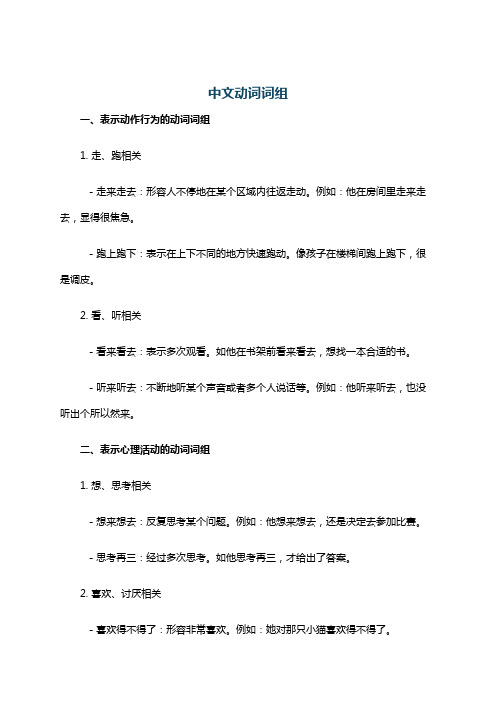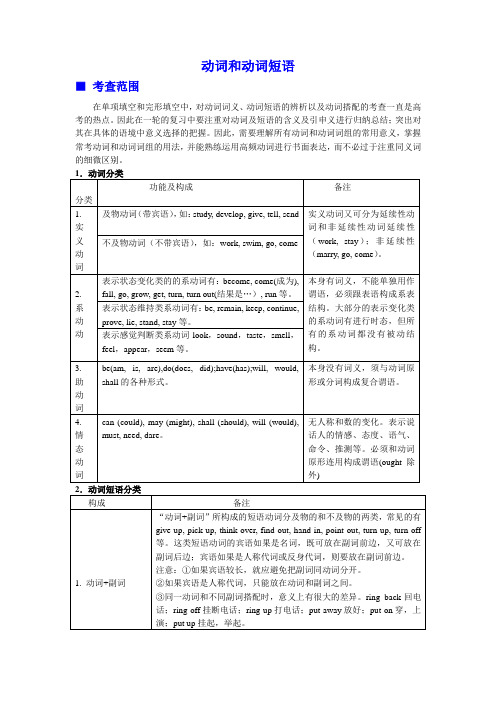动词和动词词组
动词和动词短语

动词和动词短语1.接不定式(不接动名词>作宾语的24个常用动词afford(买得起;有能力做>,agree(同意>,arrange(安排>,ask(要求;让>,beg(请求>,fail(失败>,choose(选择>,decide(决定>,demand(要求>,determine(决定>,expect(期待>,fear(害怕>,help(帮助>,hope(希望>,learn(学习>,manage(设法>,offer(提出>,plan(计划>,prepare(准备>,pretend(假装>,promise(许诺>,refuse(拒绝>,want(想要>,wish(希望>NqFaLH4sHkIt is a very important exam so I can’t afford to fail it.NqFaLH4sHk这是非常重要的考试,我不可以失败。
My neighbour offered to help me when I was in trouble.NqFaLH4sHk当我困难时,邻居主动提出帮我忙。
2.接动名词(不接不定式>作宾语的28个常用动词admit(承认>,advise(建议>,allow(允许>,appreciate(感激>,avoid(避免>,consider(考虑>,delay(推迟>,deny(否认>,dislike(不喜欢>,enjoy(喜欢>,escape(逃避>,fancy(想象>,finish(完成>,forbid(禁止>,stand(忍受>,imagine(想象>,keep(继续>,mention(提到>,mind(介意>,miss(错过>,permit(允许>,practise(练习>,prohibit(禁止>,report(报道>,risk(冒险>,stop(停止>,suggest(建议>,understand(理解>NqFaLH4sHkI really appreciate working with someone who does such a good job.NqFaLH4sHk我非常乐意与工作如此出色的人共事。
高考常见的动词词组动词词组

1. 动词+aboutcare about 对…在乎come about 发生(vi)bring about 引起,使发生hear about 听说set about doing 着手,开始做think about 思考worry about 为…担心2. 动词+ ataim at 目的是call at 拜访(地点)come atglance at 匆匆一瞥glare at 怒视laugh at 嘲笑knock at 敲(门,窗)point at 指向run at 冲向shoot at 向…射击shout at 冲某人嚷嚷smile at 冲某人微笑stare at 凝视tear at 用力撕wonder at 惊讶work at3. 动词+awayblow away 吹走carry away 拿走,使入迷clear away 消除掉,消散give away 背弃,泄漏pass away 过世put away 收拾起来;存起来take away 拿走throw away 扔掉wash away 冲走4. 动词+backcall back 回电话give back 归还hold back 控制住;踌躇;阻止…发展keep back 隐瞒;忍住;扣下(钱)look back 回顾take back 拿回,收回5. 动词+downbreak down 坏了;垮了;失灵;分解;克服(某种情绪)bring down 使…降低;使...倒下burn down 烧毁come down 下落,传下来calm down 平静下来cut down 消减;坎倒pass down 传下来settle down 安家;安静下来slow down 慢下来take down 记下tear down 拆毁,拆除turn down 调小,拒绝6. 动词+foranswer for 对…负责apply for 申请ask for 要求得到beg for 乞求call for 要求;需要change…for…用…来换charge …for…收费;要价care for 关心;喜欢hunt for 寻找hope/ wish for 希望long for 渴望look for 寻找pay for 为…付钱run for 竞选search for 查找stand for 代表,表示take… for 误以为…是…wait for 等待7. 动词+fromdate from 始于…(=date back to)differ from 与…不同die from 因…而死hear from 收到某人来信keep/ prevent/ stop …from doing阻止learn from 向…学习result from 由于separate… from 把…分离开suffer from 受…苦8. 动词+inbreak in 强行进入;插话bring in 引进;赚得call in 召集;来访cut in 插入drop in 拜访fill in 填写get in 进入;收获give in 让步,投降hand in 上交join in 参加(活动)look in 来访,参观persist in 坚持result in 导致succeed in 成功take in 吸收;理解;欺骗9. 动词+intoburst into 闯入;迸发change ….into…把…变成…divide…into…把…分成…look into 研究;调查put/ translate…into…翻译run into 碰到turn into 变成10. 动词+ofapprove of 赞成complaim of 抱怨consist of 组成die of 死于dream of 梦到hear of 听说rob sb. of 抢劫某人某物speak of 谈到talk of 谈到think of 想到11. 动词+offbreak off 打断carry off 带走cut off 切断;断绝fall off 跌落,掉下get off 脱下;下车give off 散发出go off 走开,消失,坏掉keep off 避开;勿走进knock off 把…撞落leave off 中断,停下pay off 还清put off 延期,推迟see off 送行set off 出发,上路show off 炫耀start off 出发take off 脱下;起飞;腾飞;模仿turn off 关掉;turn sb off 使某人厌烦12. 动词+onbring on 使…发展carry on 继续,进行call on 拜访call on sb to do 号召某人去做congratulation to sb on sth祝贺depend on 依靠feed on 以…为生go on 继续,进行insist on 坚持have on 穿着keep on 继续look on 旁观live on 以…为生move on 继续移动,向前走operate on 给…做手术pass on 传受,传递put on 穿上,戴上,上演rely on 依靠spend…on sth/ in doing 在某方面花钱take on 雇佣;呈现;承担(任务)try on 试穿turn/ switch on 打开work on 从事13. 动词+outbreak out 爆发bring out 阐明burst out 迸发carry out 执行come out 出来;出版;开花drop out 辍学;退出figure out 算出find out 查处give out 散发;分发;用完;劳累go out 熄灭hand out 散发help out 救助hold out 伸出;坚持下去leave out 省略,删掉let out 泄漏,发出(声音)look out 小心keep out 使…不进入make out 理解,看清楚pick out 选出point out 指出put out 扑灭run out 被用完run out of 把…用完set out 出发;开始做to dosend out 发出;派遣speak out 大胆讲出try out 使用,试验turn out 结果是;生产wear out 突破;使…疲劳work out 算出;制定;运行结果;锻炼14. 动词+overget over 克服;恢复go over 复习;审查,研究fall over 跌倒,摔倒look over 翻阅;检查roll over 翻滚run over 看一遍,压死take over 接管think over 仔细考虑turn over 翻倒;细想15. 动词+toadd to 增添add….to…把…增添到…agree to 同意attend to 照料belong to 属于come to 共计;苏醒compare …to…与…相比devote to 致力于get to 到达happen to 发生lead to 导致listen to 听object to 反对point to 指向refer to 谈到;涉及到;参阅reply to 答复see to 处理,照料stick/ hold/ keep to 坚持supply… to 为..提供turn to 查阅;向…求助write to 给某人写信16. 动词+upbreak up 分解,解散bring up 抚养build up 建立catch up with 赶上clear up 整理,收拾;放晴come up 上来;出现cut up 切碎do up 整理,包装eat up 吃完end up 结束fix up 修理;安排,装置get up 起床,站起give up 放弃,停止go up 增长,上涨grow up 成长hurry up 赶快keep up 保持hold up 耽搁,使停顿lay up 积蓄look up 查找,找出make up 组成;编造;铺(床);和好open up 开创pick up 拾起;学会;接某人;接受put up 搭起;住宿;张贴ring up 打电话send up 发射set up 架起;建立sit up 熬夜speed up 加速stay up 熬夜take up 开始做;从事;继续;占据tear up 撕碎throw up 吐turn up 调大;出席,出现use up用完17. 动词+withagree with同意begin with以…开始combine with结合compare…with…对比cover with覆盖deal with处理do with处理end with以…结束equip …with…装备fill with装满play with玩耍provide sb with sth提供provide sth for sb meet with遇到,遭受share with分享supply sb with sth提供supply sth to sb talk with和某人谈话18. 动词+throughget through通过;完成;接通电话go through审查,检查live through经历look through翻阅,仔细察看pull through渡过危机see through识破动词+名次+介词catch sight of 瞧见,看见catch/ take hold of 抓住devote oneself to 致力于do harm to 对…有危害do wrong to 冤枉,委屈feel/ have/ take pity for 同情fix one’s eyes on 凝视form the habit of 养成习惯get in touch of 联系上get rid of 去除give advice on 提出建议have trust in 相信have (no)difficulty in (没)有困难have a word with 同某人谈话have words with 和某人争吵have a look at 看have/ show/ feel/ (an)interest in对某物感兴趣have effect on 对…有影响have mercy on 同情怜悯have the honor of 有…的荣幸help oneself to自便keep in touch with 保持联系make friends with 交朋友make fun of 取笑make good/ full use of 利用make (the) best use of 充分利用make an apology to 道歉make a fool of 愚弄make one’s way to 走向make preparations for 为.. 做准备make room for 为…留地方pay a visit to 访问pay attention to 注意put one’s heart to 全神贯注于set fire to=set sth on fire 点火show respect for 尊敬say hello/ goodbye to 打招呼/道别set an example to 树立榜样shake hands with 握手take aim at 瞄准take charge of 负责管理take the side of 支持take pride in 因…而自豪take part in 参加take a photo of 照相take a message for 捎个口信take care of照顾take notice of注意take the place of代替throw light on 阐明动词+副词/形容词+介词add up to 总计为break away from 脱离,挣脱be up to 应由…轮到…cut down on 消减catch up with 赶上come up to 达到(标准)come up against 遭到(反对,困难)do well in 做得好do away with 废除drop in on/ at 拜访人/地face up to 面对,承担fit in with 适合,符合get down to 开始认真做get close to 接近get into the habit of养成习惯get used to 习惯get on/ along with 进展,相处get out of 从…出来,摆脱go on with 继续go back on 背信,背弃go in for 参加,爱好keep away from 远离keep up with 跟上live up to 不辜负look/ watch out for 小心look back upon 回顾look forward to 期待look up to 尊敬look down upon 轻视make up for 弥补put up with 忍受think highly of 高度评价work hard at 努力于动词+介词+名词arrive at/ come to aconclusion得出结论burst into pieces 成为碎片burst into laughter/ tears 突然大笑/大哭come into use 开始使用come into power 当权coem into being 产生do up one’s hair 梳理头发get in a word 插话make up one’s mind 下决心。
中文动词词组

中文动词词组
一、表示动作行为的动词词组
1. 走、跑相关
- 走来走去:形容人不停地在某个区域内往返走动。
例如:他在房间里走来走去,显得很焦急。
- 跑上跑下:表示在上下不同的地方快速跑动。
像孩子在楼梯间跑上跑下,很是调皮。
2. 看、听相关
- 看来看去:表示多次观看。
如他在书架前看来看去,想找一本合适的书。
- 听来听去:不断地听某个声音或者多个人说话等。
例如:他听来听去,也没听出个所以然来。
二、表示心理活动的动词词组
1. 想、思考相关
- 想来想去:反复思考某个问题。
例如:他想来想去,还是决定去参加比赛。
- 思考再三:经过多次思考。
如他思考再三,才给出了答案。
2. 喜欢、讨厌相关
- 喜欢得不得了:形容非常喜欢。
例如:她对那只小猫喜欢得不得了。
- 讨厌至极:表示极度讨厌。
像他对那种虚伪的人讨厌至极。
三、表示存在变化的动词词组
1. 生长、发展相关
- 生长起来:强调植物或者事物开始生长的过程。
例如:春天到了,小草慢慢生长起来。
- 发展壮大:表示事物不断发展变得强大。
如这个企业经过多年努力发展壮大。
2. 消失、出现相关
- 消失不见:强调完全消失的状态。
例如:那只小鸟很快就消失不见。
- 出现了:表示某物或者某人开始出现。
如一个陌生人突然出现在门口。
高考复习动词和动词短语

A your cell phone when 8. Terry, please _____ Grandma is talking to you. (安徽2014) A. look up from B. look into C. look back on D. look through 9. Shakespeare’s writing is still popular B the test of today. It has really _____ time. (安徽2014) A. failed B. stood C. taken D. conducted
2. 动词短语辨析。主要包括同根动词短语 的辨析、同根介词或副词的动词短语的 辨析、 不同动词构成的动词短语的辨析 以及“动词+副词+介词”短语的辨析。 在动词词组的测试中,绝大多数为基础 动词,出现频率较高的词有:get, turn, make, put, go, give, break, cut, come, look, keep, bring, show, pick, hold, fall, carry, pull, catch, call, take等。
4. As a grassroots singer, she reads everything she can _____ B concerning music, and takes every opportunity to improve herself. (福建2014) A. catch sight of B. get hold of C. take charge of D. make mention of
Ralph W. Emerson would always _____ D new ideas that occurred to him. (陕西2014) A. set off B. set about C. set up D. set down
词组类型举例

词组类型举例摘要:1.词组类型简介2.常见词组分类与举例3.词组在英语学习中的应用4.如何提高词组运用能力5.总结正文:【1】词组类型简介在英语中,词组(Phrase)是由两个或多个词组成的语言单位,具有一定的语法和语义功能。
词组可以分为多种类型,如动词词组、名词词组、形容词词组等。
下面我们将简要介绍几种常见的词组类型。
【2】常见词组分类与举例1.动词词组:动词词组是指由动词和其宾语、补语等构成的词组。
例如:eat breakfast(吃早餐)、have a chat(聊天)、do some shopping(购物)等。
2.名词词组:名词词组是由名词和其修饰语组成的词组。
例如:a small gift(一个小礼物)、an interesting book(一本有趣的书)、the beautiful scenery(美丽的风景)等。
3.形容词词组:形容词词组是由形容词和其修饰语或被修饰的名词组成的词组。
例如:a tall man(一个高个子男人)、an attractive proposal(一个有吸引力的提议)、a difficult problem(一个困难的问题)等。
4.介词词组:介词词组是由介词和其宾语组成的词组。
例如:on the table(在桌子上)、in the box(在盒子里)、behind the door(在门后面)等。
5.副词词组:副词词组是由副词和其修饰的动词、形容词等组成的词组。
例如:quickly(快速地)、carefully(小心地)、happily(开心地)等。
【3】词组在英语学习中的应用词组在英语学习中起着重要作用,掌握丰富的词组有助于提高口语、听力、阅读和写作能力。
在学习过程中,我们要注意积累各种类型的词组,并学会在实际语境中灵活运用。
【4】如何提高词组运用能力1.多读:阅读英语文章、书籍、报纸等,积累各种类型的词组。
2.多听:收听英语广播、观看英语电影和电视剧,模仿母语使用者的发音、语调和语速。
高考英语词法系列:动词和动词短语

动词和动词短语■考查范围在单项填空和完形填空中,对动词词义、动词短语的辨析以及动词搭配的考查一直是高考的热点。
因此在一轮的复习中要注重对动词及短语的含义及引申义进行归纳总结;突出对其在具体的语境中意义选择的把握。
因此,需要理解所有动词和动词词组的常用意义,掌握常考动词和动词词组的用法,并能熟练运用高频动词进行书面表达,而不必过于注重同义词的细微区别。
■高频考点高考对动词的考查重点集中在实义动词的常见意义和用法,而对助动词的考查较少。
对动词短语的考查重点是第1~3项,而考查第4~6项的情况较少。
高考试题分析■真题探究1.(2010安徽)No matter how low you consider yourself, there is always someone ______you wishing they were that highA. getting rid ofB. getting along withC. Looking up toD. looking down upon【答案与解析】C getting rid of意为“摆脱;去除”;getting along with意为“与……相处;进展”;Looking up to意为“尊敬;敬仰”;looking down upon意为“看不起;轻视”。
句意为“你无论认为自己怎样低下, 总希望有个高尚的人来尊敬你。
”2. (2010全国Ⅰ)The workers ______ the glasses and marked on each box “ This Side Up”A. carriedB. deliveredC. pressedD. packed【答案与解析】D 句意:工人们把玻璃制品包装好并且每个盒子上标记上“此面向上”。
选项为四个意思上毫无关联的动词, 此题考查动词的词义辨析。
carry 译为搬运, deliver译为递送, press译为按, 压, pack译为打包。
动词与动词短语

第四讲动词和动词短语考点一动词的分类1,及物动词:可直接加宾语。
如:do, hate, like, marry, say, tell.2,不及物动词:加适当的介词后再加宾语。
如:come, go, arrive3,助动词:have (has, had),do (did, does)4,可接双宾语的动词如: show, buy, sell, offer, make, teach, award等,其用法为:1,动词+间宾(人)+直宾(物)buy me a book.2,动词+直宾+for(为)+间宾buy a book for me.3,动词+直宾+to(方向)+间宾show the book to me.5, 系动词:be (am, is, are, was, were)除be动词外,还有些动词可以用作连系动词,它们不能单独作谓语,必须与表语(多为形容词)一起构成合成谓语。
【对点演练】一. 单句语法填空,根据汉语提示完成句子。
1.You know how I ____(讨厌)math.2.He _________(进入)the room and shut the door.3.Do you ____(助动词)something to eat?4.He is saving up to buy a house ____(介词) his family.5.He ___(系动词) staying with friends this weekend.答案:1 hate 2came into 3have 4for 5is二. 单句语法改错1.Now I like to the film some.2.Will you go us? Sure!3.Love me as I love you?4.Do not expect him to show kindness for you.5.I will brain you if you don't keep quietly.答案:1去掉to 2 go后面加with 3Love前面加Do,且Love改love 4for改to 5quietly改quiet考点二动词辨析1. 重点掌握某些近义词的辨析如:admit, allow, permit; contain, include; receive, accept; want, wish, hope, expect; stay, remain, keep; discover, uncover等。
高中英语语法过关辅导课件-动词和动词词组

She went through the book before buying it. She went over the lessons for three times. He had to go without food. The ship is heading for the nearest port. He is looking up a new word in the dictionary. The boy looked through the picture book. She put up a picture on the wall. The match is put off owing to the rain. The bus ran over his legs. His illness results from overeating. Overeating results in his illness.
You will answer for what you’ve done. The boy asked for more food. He doesn’t care for playing football. I came across an old friend in the street.
call up打电话
到进一步发展,不能与名词purpose搭配使用。obtain“获得,得
到”,多指获得信息、知识、忠告、许可等,不能与purpose搭配。 reach“达到,达成”,在此最具迷惑性,但reach多与conclusion,
decision, agreement, destination等名词搭配,不能与purpose搭配。
sth.“因某事而控告某人”。blame“责备,责怪”,常与介词for
- 1、下载文档前请自行甄别文档内容的完整性,平台不提供额外的编辑、内容补充、找答案等附加服务。
- 2、"仅部分预览"的文档,不可在线预览部分如存在完整性等问题,可反馈申请退款(可完整预览的文档不适用该条件!)。
- 3、如文档侵犯您的权益,请联系客服反馈,我们会尽快为您处理(人工客服工作时间:9:00-18:30)。
知识结构网状态:b e持续:keep, last ,remain ,stay, lie,stand似乎:seem,appear感官:look,smell,taste,feel,sound系动词变成:become,grow,go,get,turn,come,fall,run证明:prove,turn out1帮助现在分词构成现在进行时2帮助过去分词构成被动语态Be 3帮助不定式构成beto do结构,表示将来,命令,征求意见,约定等。
1帮助实义动词构成疑问句,否定句助动词 do 2帮助实义动词原型构成强调式3用来代替动词按用法 have帮助过去分词构成完成时态分shall/will/would/should帮助谓语动词构成将来时态宾语及物动词双宾语复合宾语实义动词不及物动词动词情态动词延续性动词:last;keep按意义分动词和非延续性动词:die,leave,come动词词组动词+介词:look at; take on动词+副词:find out ,turn up动词词组动词+副词+介词:come up with, go in for动词+名词+介词:take part in ,take care ofBe+形容词+介词:be ready for ,be devoted to 考点一:动词及动词辨析1,achieve,gain,win,earn(1),achieve,vt. 强调通过极大努力获得或达到某事物,实现弯沉,常与一些抽象名词连用,如:success,goal(2),gain vt 指获得,赢得(尤指想要的或所需的事物)。
此外,gain 还有增加的意思 I gained the impression that the matter had been settled The plane rapidly gained height. Gain weight= put on weight(3),win vt 表示在较强的竞争中取得胜利,它通常跟的宾语有game,war ,prize, fame, battle(4),earn vt. 表示挣钱,赚工资,因自己成就行为等,得到应得的事物,博得,earn one’s living 谋生2,adapt, adjust, adopt(1),adapt 使适合,使适应 adapt (oneself)to …使自己适应。
We have to adapt ourselves quickly to the new system.(2),adjust 调整,调节。
(3),adopt,收养,采用某方法。
All three teams adopted different approaches to the problem.3,advise, persuade,suggest(1),advise作建议,劝告,是否劝成功,未必知道。
其后常接:名词或代词,动名词,不定时符合结构,that从句(从句谓语动词常用虚拟语气)即:advise+doing/ sb to do / that从句注意:advice是名词,为不可数名词,(2),persuade,劝服,强调劝说成功,常用语结构:persuade sb to do sth和persuade sb into doing sth 如:Though the doctor advised her patient to give up smoking ,yet she wasn’t able to persuade him to do so .(3),suggest是既无动词,常作提议,建议讲。
后接名词或代词,动名词,疑问词+不定时短语,从句(接从句时,要用虚拟语气)。
但不能接不定式或复合机构。
即:suggest +doing/ what to do /that 从句(should do)4,arise, rise, raise, arouse(1),arise vi. Arose, arisen。
指:问题等的产生/出现。
We keep them informed of any changes as they arise. 如有任何变化,我们随时通知他们。
(2),rise vi. Rose risen。
升高,上升。
作上升讲时指继续上升,常用语日月云烟价格及人的职位。
(3),raise vt. Raised,raised。
举起,饲养,提高。
Raise作举起讲时,有使物体达到应有的高度的含义。
(4),arouse vt. Aroused ,aroused。
引起,激起,唤醒。
He succeeded in arousing the nation’s sympathy.5,acquire,require, request(1),acquire vt.指通过努力,能力,行为表现等获得,得到,强调一个渐进的过程。
(2),require,需要 The pets require a lot of care.(3),request vt. 正式或礼貌地请求,要求。
多含担心种种原因对方不能答应的意味。
You are requested not to smoke here.注意:require做需要讲时,后可接没动名词的主动形式表示被动意义,相同用法的动词还有need,want。
Require/request 后接宾语从句时,从句谓语要用虚拟语气,即:should do ,should可以省略。
6,feel ,touch7,become, get, turn ,go(1),谈到人或物的状态,外贸等的变化时,常用become,get, turn,go 后接形容词,总的来说,become和turn比get和 go更文雅。
(2),只一个人暂时性的身心变化或永久性的自然变化,可用become 或get,后者较通俗。
如become/get + angry, famous , fat , ill ,old。
Become 和get还都可用于指天气的变化和社会的趋势。
(3),指某人肉体上或精神上由强转弱时,用go。
如:go bald 秃/ deaf /insane。
Go 有时也指事物由强到弱或由好变坏。
The meat’s gone off/bad .肉变味/坏了。
(4),go和turn可用于指人或事物的颜色变化。
Go/ turn green (5),go 一般不予old,tired,ill等连用,于此情况要用其他连动词。
如:become/ grow/ get old。
Fall/ become ill/ sick 生病; get/ feel tired 累了。
(6),turn后可以加年龄或时间,表达到某年龄或时间 It’s turned midnight.(7),常用的连系动词: 1)单纯表示主语特征或状态的连系动词:feel , look, sound, taste , smell ,seem , appear2)表示发生变化的连系动词:fall, go ,come, run 等3)表示保持某种状态的连系动词和词组:remain,continue,stay, keep,prove,turn out ,stand等。
8,speak,talk,say, tell(1),以上四个词中,speak,talk为不及物动词,但speak后加语言名称作宾语时为及物动词。
Speak强调单方的说或讲,而talk强调双方交谈,表示同某人谈论某事。
常用搭配:speak to/with sb about sth ; talk to/ with sb about sth 。
(2),say,tell 可做及物动词,say强调说话内容,tell表示告诉,可接双宾语,常见结构:say sth to sb, tell sb sth= tell sth to sb。
Tell sb to do sth。
另外,tell与介词from连用表示区分,辨别。
常与can,be able to 连用。
Can you tell true friends from false ones?(3),say强调说话内容,但主语未必是人,黑板,药瓶,书信,符号都可以做其主语,意为:give information or instructions。
如:a notice saying“Keep Out”The law says this is quite legitimate.(4),习惯表达方面的区别:1)表示演说,演讲,发言等。
一般用speak。
2)在某些搭配中 tell a story tell a lie。
It says a lot for her that she has never lost her temper. (it says a lot/ very little …for sb/ sth, 用以揭示关于某人/某物的事实)9,join ,connect, combine(1),connect多指两事物在某一点上相连接,但彼此仍保持原有状态。
该词也用于物与物或人与人之间的联系,以及动力通过某种接触方式从动力源输送到用户。
(2),join一般用于,多指两个或两个以上的物体通过相互作用或由于紧相毗邻而结合成为较大的物体。
该词的联合,汇集关系比connect更为紧密;用作抽象意义时,可指个人组成集体或参加某一团体。
(3),combine意为使结合,使联合。
指为了某一目的而把两事物结合在一起最后结合成统一的一种特性。
Combine hydrogen with oxygen 10,fit, suit ,match(1),fit和suit都可表示适合或合适。
Fit主要指尺寸,大小,形状等方面的合适。
而suit则主要指款式或花色等方面的适合。
This dress doesn’t me.(2),suit还可以用来谈论某种安排和情况是否方便。
Tuesday would suit me for a meeting.(3),match主要表示与…相配或相称,使….相配/相配。
(4),match有时还可用作不及物动词,表示相配和相称。
The curtain andthe paint don’t match.(5),match…to,,, 使…与…相匹配; match up to 比得上;match with…与….相配; match …with….. 使…与….相匹配11,draw, pull,drag三者都可表示拉,区别如下:(1),如果表示将某物拖动了位置,用draw或pull均可,(2),如果没有位置变化,常用pull(3),draw表示很轻松的拉出,pull比draw费劲,而drag侧重于用力拖拉。
